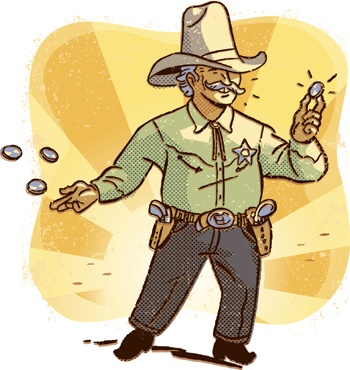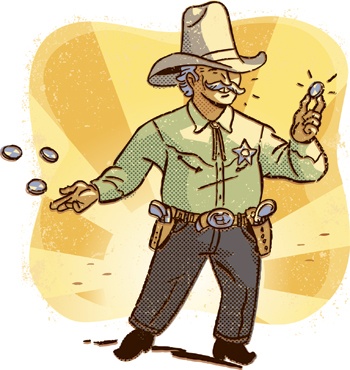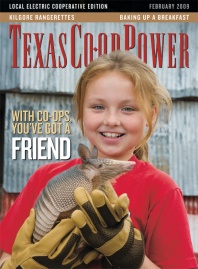There’s something about a silver dollar that makes it so much more appealing than the plain old folding green stuff. The chunky bucks shine with an aura of the Old West. Holding one in my hand, I always feel an urge to plunk it down on an antique bar and order up a shot of whiskey.
To James Marion “Silver Dollar Jim” West Jr. of Houston, the eight-bit coin was much more than mere lucre. It was a magic ticket, a powerful symbol of the land that bore his name. The heir to fortunes in ranching, timber and other resources greatly desired that his fellow Texans savor its romantic allure.
Custom pockets sewn into Silver Dollar’s duds could hold as many as 80 silver dollars. Jim used them as tips and gifts of greeting wherever he went. When the spell was strongest, the millionaire would grab a handful, fling ’em into a crowd and watch folks scramble for the rolling dinero.
To the chagrin of Houston’s less imaginative elite of the mid-20th century, Silver Dollar Jim liked to run around Texas “looking like a deputy sheriff out of an old western movie,” as James Aswell described him in a 1953 Collier’s profile. An Associated Press reporter marveled at West’s monogrammed cowboy boots, gold-handled sidearms in jeweled holsters, ornate gold belt buckles and platinum collar points. Aswell rated Jim’s headgear as “the 15-gallon Texas economy size.” A treasured official Texas Rangers badge, rarely bestowed upon private citizens, adorned Jim’s chest. As the badge was too small for silver dollars, Jim customized it with diamonds instead.
Guests at West’s Figure 2 Ranch near Eagle Pass could belly up to the bar and play a slot machine rigged to pay off every time. At his Madison County ranch in East Texas, according to stories gathered by the late Texana specialist Frank X. Tolbert, Silver Dollar Jim often kept neighbors awake by blasting his country-western records all night long from a tower fitted with powerful loudspeakers. A portable sound system on a trailer allowed West to take his disc jockey act on the road, rolling through Madisonville and North Zulch at 4 a.m., serenading townsfolk with Hank Williams, Hank Thompson and Hank Snow. For towns deprived of the comforting sound of trains passing in the night, he played records of railroad sound effects.
Next to silver dollars and country music, the millionaire loved law enforcement. Though he resembled an Old West lawman, Silver Dollar Jim was definitely 1950s high tech. Wherever he was at any given moment—in his bedroom, office or garages sheltering his dozens of customized automobiles—special radio and telephone units kept him informed of the latest developments in Houston’s crime scene. Detectives rode the all-night beat with Jim, monitoring the streets in plush Cadillacs equipped with .28-gauge sawed-off shotguns, .30-.30 rifles, Tommy guns and state-of-the-art communications hardware.
With his reputation for passing the silver, Jim found himself constantly besieged with pleas for aid. One request that he rewarded came from an 8-year-old Irish boy. The lad wrote a letter asking for a cowboy outfit and addressed it to “Any Millionaire, Houston.” The post office delivered the letter to Silver Dollar Jim. Believing that no one should suffer through life sans dude ranch duds, Jim shipped the boy a complete Western ensemble. A photo of the little buckaroo dressed for ridin’ the range occupied an honored spot among the millionaire’s mementos.
Sam Griswold also received the Silver Dollar treatment as a youngster. His parents were good friends with West’s nurse and her husband. “I always thought he was kind of an honorary Texas Ranger,” Griswold said. “Department of Public Safety troopers brought him to our house in Dallas four times, always late at night, and we kids would be roused from our sleep to receive his greetings, a case of Snickers, and four or five 19th-century silver dollars. We were impressed beyond words and frozen in place.”
After Silver Dollar Jim died in 1957, Houstonians learned that he kept an ace in the hole. Before his primary residence in River Oaks was torn down, executors of his estate found some $290,000, mostly in silver dollars with some stacks of $2 bills mixed in, secreted in his cellar vaults. As Time magazine remarked, “Jim West was no man to let himself get caught in the embarrassing plight of having to hand out ordinary $1 bills.”
——————–
A chapter on Silver Dollar Jim is included in Gene Fowler’s Mavericks: A Gallery of Texas Characters (UT Press, 2008).



